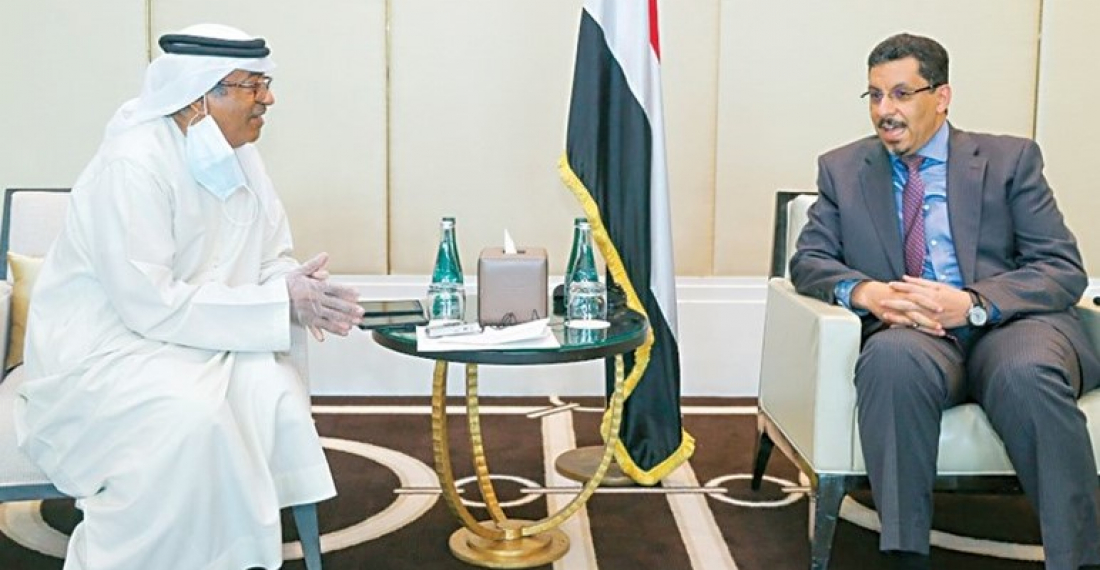The Yemeni foreign minister, Dr Ahmed Awad bin Mubarak, said in an interview with Al Ittihad newspaper that his country would not allow itself to be a pressure card in the hands of Iran in its negotiations with the international community on the nuclear agreement. The minister said Tehran responsible for the conflicting sides not reaching an agreement to end the war in Yemen.
Bin Mubarak is on an extended Gulf tour where he is stressing strong ties between Yemen and its neighbours and gathering support to end the war. He has travelled to Bahrain, Saudi Arabia, UAE and Oman before arriving in Cairo for an Arab League meeting.
Speaking to Al Ittihad newspaper in Abu Dhabi, said that his visit aims to coordinate, consult and unify visions about common challenges. The minister added that developments in the situation in Yemen will reflect positively or negatively on the Gulf countries, and therefore preserving the unity, security and stability of Yemen is a guarantee of the security and stability of the Arabian Peninsula.
In Bahrain, bin Mubarak met with his counterpart, Dr Abdul Latif Al-Zayani, and discussed bilateral relations. Bin Mubarak stressed the need to coordinate the two countries' positions regarding political developments in the Yemeni arena and working to achieve peace and stability in the region by activating the strategic dialogue between the two sides, as well as activating a program for training and qualifying Yemeni diplomats at the Mohammed bin Mubarak Institute of the Bahraini Ministry of Foreign Affairs.
Speaking to the Bahraini Al Ayyam newspaper, bin Mubarak stressed the importance of separating the Yemeni crisis from the Iranian nuclear file, in order to avoid linking the fate of Yemen to an intractable file that may last for many years, and if the two files are allowed to be linked, the humanitarian crisis in Yemen will worsen and the Yemeni fighting will escalate.
At the meeting for Arab League foreign ministers meeting in Cairo, bin Mubarak said that the Yemeni people are resisting the aggression on Arab national security. The Secretary general for the Arab League, Ahmed Aboul Gheit, stressed the importance of placing greater international pressure to pave the way for engaging in a political process that includes all parties.
In the meantime, the US Envoy to Yemen, Timothy Lenderking, visited Oman, UAE, Qatar and Kuwait meeting with the key figures in these countries.
On Wednesday, Reuters reported that US officials have met Yemen's Houthis in efforts to end the war. The meeting, which has not been announced officially, allegedly happened between Lenderking and Houthis’ chief negotiator Mohammed Abdusalam in the Omani capital Muscat on 26 February.
The Muscat meeting, one of the sources said, was part of a new “carrot and stick” approach by U.S. President Joe Biden, who last month declared a halt to U.S. support for the Saudi-led military campaign.
The sources said Lenderking had pressed the Houthis to halt the Marib offensive and encouraged the movement to engage actively with Riyadh in virtual talks on a ceasefire.
Saudi Arabia has already been negotiating with the Houthis for about a year now both directly and under the auspices of the United Nations. They are seeking assurances on border security and curbing the influence of regional arch-rival Iran
Source: commonspace.eu with various agencies.
Picture: Ahmed bin Mubarak speaking to Ali Al-Amoudi from Al Ittihad newspaper.






